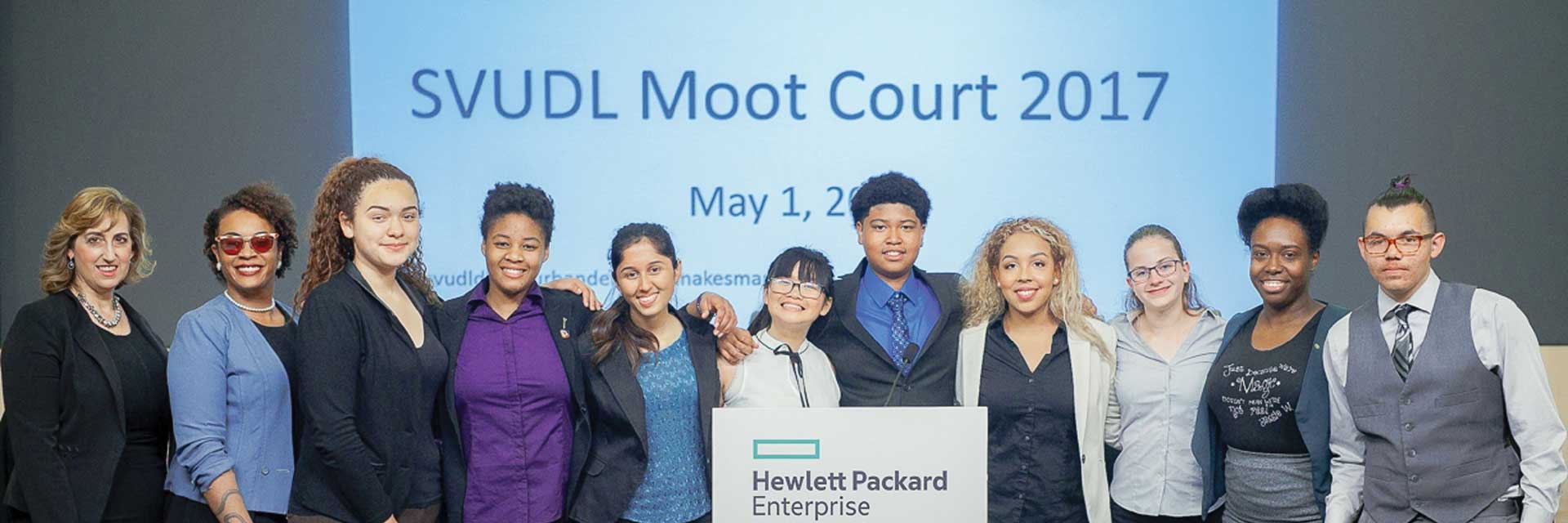
Palo Alto may conjure up images of unbridled wealth, hip workplaces and Tesla dealerships, but there is another side to Silicon Valley and its environs – that of East Palo Alto, with its underprivileged schools and one in four youths living in poverty.
For some of these young people, embarking upon a legal career seems a road fraught with so many perceived obstacles, that it’s just not worth the struggle.
But working to make a difference is the Silicon Valley Urban Debate League (SVUDL), part of a national phenomenon introducing students from disadvantaged backgrounds to the practice of debating.
According to SVUDL executive director Monica Spear, there are many benefits of debating for those who take part: ‘It builds confidence, public speaking and literacy skills. It also connects youths to a positive community of their peers, and to adults who are truly invested in them as individuals.’
A 2015 study showed that urban debaters were 53% more likely to test as college-ready in reading; 68% more likely to graduate high school; 84% more likely to enrol in college; and 103% more likely to graduate college than their non-debating peers. And so far, over 40 law school deans and professors from top schools have joined in a statement of support endorsing the connection between urban debate, and racial and economic diversity in the legal profession.
SVUDL focuses its efforts on ‘Title 1’ high schools – those where at least 40% are entitled to free or reduced-price lunches. ‘These schools are often under-resourced and the students are under-represented. We look at the diversity of the school population and we prioritise working with students of colour, low-income and first generation students [the first generation in their family to apply for college],’ says Spear. ‘We went from two pilot schools to five, and we now partner with seven schools. In just under three years, we have tripled our partnerships and the student base.’
Students spend time researching complex topics, writing briefs and arguing cases, just like lawyers.
The students: giving voice
Moot Court debater Nyisha Young says that debating has given her the confidence to express herself more effectively: ‘It has helped me go up and have conversations with people, give them a compliment or even just maintain eye contact with them. Speaking in front of the judges and competing has made me more open to human connections via being able to talk persuasively.’
Kimberely Lam, who formed part of the team representing the school board, agrees. ‘I am so much more comfortable taking to people I don’t know and people I might not have felt comfortable talking to normally. We had some law firm visits where we talked about the impact SVUDL has had on us, and my supervisor just told us last minute, “You’re going to do a speech in front of 30-40 lawyers.” I felt like I was going to barf! But I delivered it and there were actual lawyers, people who I look up to, laughing at my jokes and listening to me.’
Being able to practice debating using a legal format gave Lam a new perspective on being a lawyer. ‘It’s interesting to see what we would be doing if we were attorneys – looking through the brief and preparing it for months. Before this I would have said that law was boring, and would not have thought about it as a career. But going through this experience has made me think about a career in law,’ she says.
Santiago Pachecho already wanted to be a lawyer, but was sceptical about debate at first. He soon changed his mind, however. ‘I saw there was so much more to it than just speaking. You have to research a topic and you find yourself learning things. You get to include things that you are passionate about.’
The experience has also left him with concrete tools: ‘I now have a legal mentor whom I can talk to regularly and who will help guide me through the steps I need to become a lawyer.’
On 1 May this year, these skills were put to the test, as SVUDL in association with Hewlett Packard Enterprise (HPE), held its second ‘Moot Court’ event at the HPE campus in Palo Alto. A group of six students from Silicon Valley schools argued in front of Judge John Owens and Judge Michelle Friedland from the US Court of Appeals for the Ninth Circuit, and Ed Davila from the US District Court for the Northern District of California. The students debated in teams of three, one side for the plaintiff and one for the defence. A seventh student served as clerk of the court, but had also trained in both plaintiff and defence arguments.
This was the first time the Moot Court had argued the facts from a real-life case, as they took on G.G. v. Gloucester County School Board. The case was selected for its high profile and relevance to a high school-age group, and concerned transgender student Gavin Grimm, who sued his school district for the right to use the boys’ bathroom.
While the substance of the arguments came from their own voices, the students were assigned mentors to assist with developing their cases, strategy and arguments. The mentors also gave the students a sense of protocol and how to act in the court. One of the evening’s most memorable moments was when Santiago Pachecho, arguing for Gavin Grimm, made parallels with the experience of African Americans during segregation. Judge Owens made a point of praising his point and, after a beat, Pachecho addressed the court, saying, ‘May I continue, your honour?’
Altering the paradigm
The scheme forms part of the Legal Career Pipeline Challenge, the brainchild of SVUDL board member and HPE deputy general counsel, Willie Hernandez. SVUDL has developed one of the strongest partnerships with the legal community of the debate league circuit, mainly due to the efforts of Hernandez. An avid debater in high school, he feels the experience gave him more choices, and as an Hispanic lawyer who was the first in his family to attend college, he is passionate about helping others to access the same opportunities.
‘If I think back to my old neighbourhood and some of the kids I knew who were really talented but didn’t get a way out, there’s a sadness at that unrealised potential,’ says Hernandez.
However, as Monica Spear points out, to make a programme like this work, you need more than one person. ‘There are not many mentors for students in our demographic,’ she says. ‘But Willie was able to recruit lawyers from many law firms and in-house legal departments from across Silicon Valley. Through this, we were able to develop a coalition of attorneys. Each legal professional paired with a student makes a long-term commitment of support, connecting with their mentees at least monthly, for six years – from the last couple of years of high school through day one of law school. Thankfully, many are willing to make that commitment.’
Kim Rivera knows the importance of role models. Although she is now chief legal officer and general counsel at HP Inc., it was only due to guidance from a family friend that she attended college at all, after being orphaned at 16 and left with caring responsibilities for her younger sister.
‘Role models that you can identify with, whether that’s because they look like you, you have something in common with them, or because they have overcome challenges similar to yours, are a powerful part of figuring out what paths are available to you and how to achieve things you aspire to achieve,’ says Rivera.
In particular, diverse role models ‘are proof that you can achieve things and they alter the paradigm of what a lawyer, judge, general counsel or other professionals look and sound like.’
Rivera’s introductory keynote at the SVUDL Moot Court event stressed the importance of acting as a role model in return, particularly ‘Looking back on your path and making sure that it’s wide and clear enough for others to pass.’
